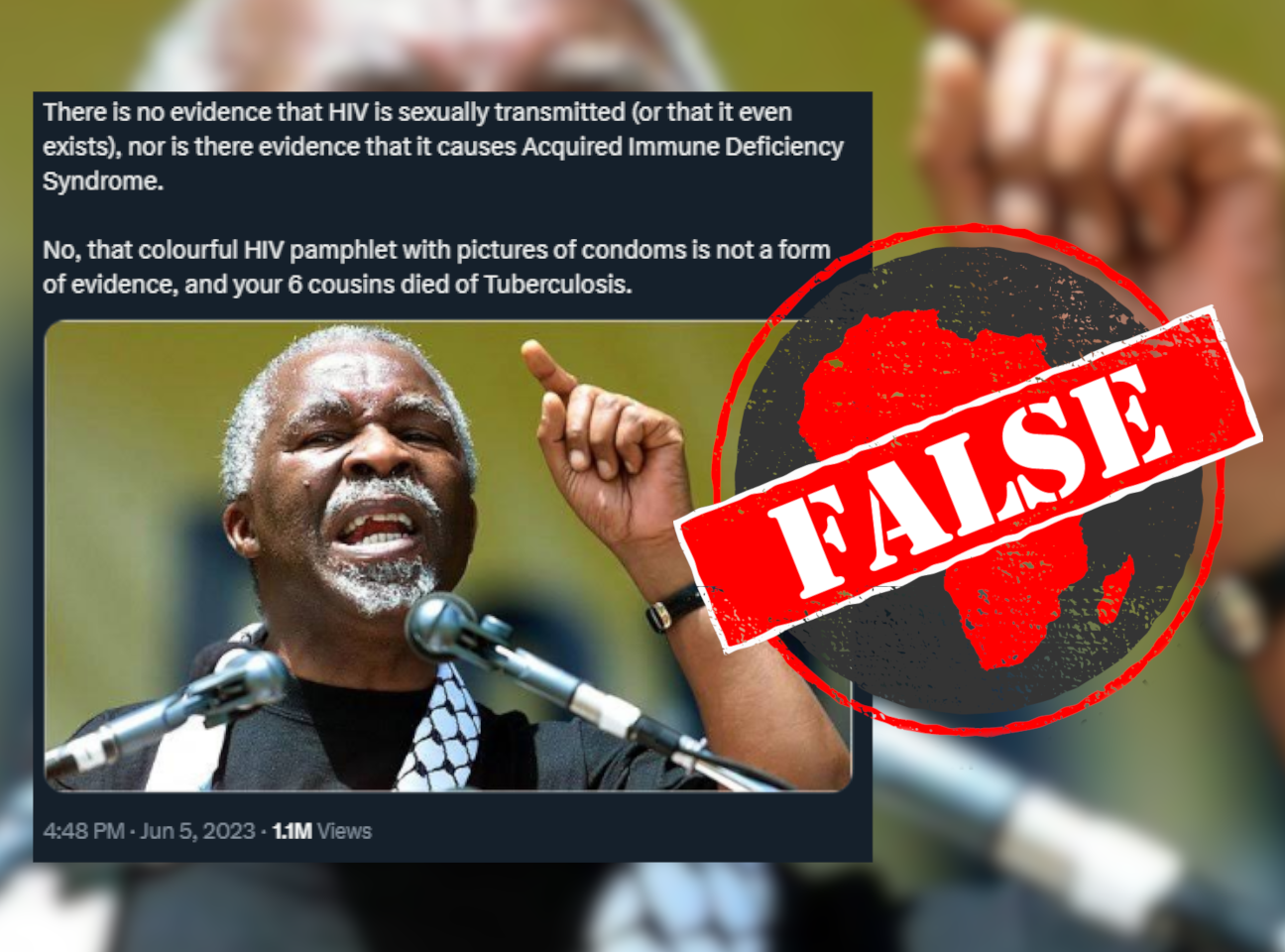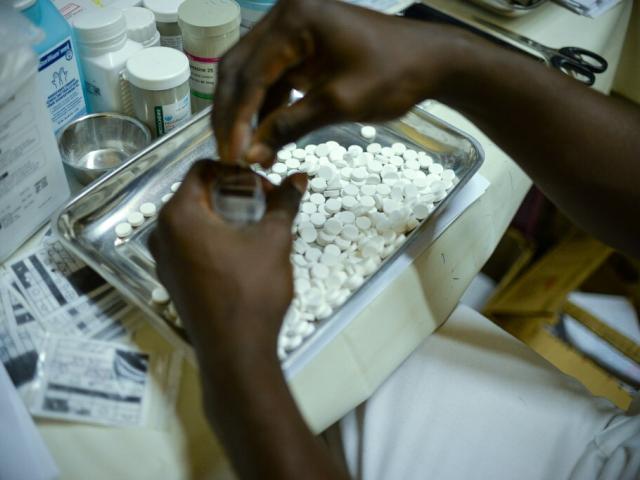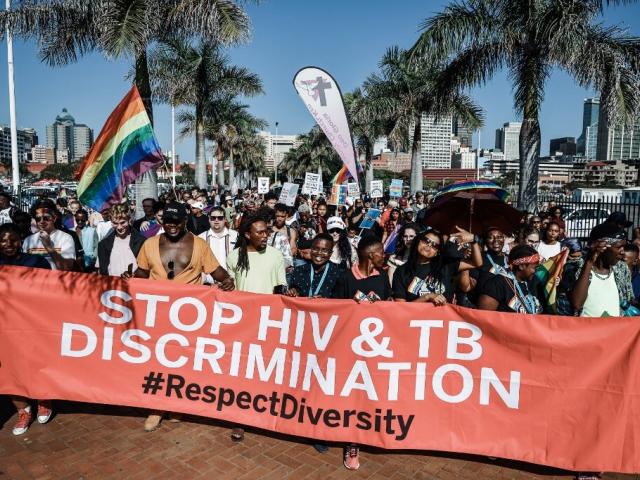IN SHORT: The existence of HIV and the link between HIV and Aids has been established by scientists for decades. But false claims disputing these connections are still repeated and are dangerous.
A tweet claiming that “There is no evidence that HIV is sexually transmitted (or that it even exists)” has been widely-shared, accumulating nearly a million views on Twitter, as well as being shared on other platforms such as Facebook.
The human immunodeficiency virus, or HIV, is a viral infection which can lead to Aids, or acquired immunodeficiency syndrome, although the tweet claims that there is no evidence for this either.
These claims are, however, incorrect. HIV is a real virus that can be transmitted through sexual intercourse and is undoubtedly the cause of Aids.
Africa Check recently published a factsheet on HIV and Aids, and an analysis on why false information about the topic can be dangerous.

Plenty of evidence for the existence of HIV
There is plenty of evidence for the existence of HIV. The virus itself is part of a family of viruses called retroviruses. It has been photographed by powerful microscopes and can even be seen infecting cells in some of these images.
HIV can spread from one person to another through bodily fluids, including blood, semen and breast milk. This means that the virus can be transmitted through sexual intercourse.
This is a well-established fact. It has also been known for decades that measures, such as condom use, decrease the chances of transmitting HIV through sex.
It is also certain that HIV is the cause of Aids. In 2000 a gathering of HIV/Aids researchers at a conference in Durban, South Africa, issued a short statement rejecting the claims of Aids denialists.
This statement, known as the Durban Declaration, was signed by thousands of doctors and medical specialists. Signatories were required to have a PhD, MD, or equivalent medical degree. It laid out a list of evidence for the fact that Aids is caused by HIV.
This included evidence that people with Aids also had HIV, no matter where they lived; that people who received blood contaminated with HIV developed Aids; and evidence that drugs which prevented HIV from replicating could reduce deaths from Aids.
First source unsubstantiated and doesn’t disprove the existence of HIV
In replies to the tweet, the account which posted it linked to three other tweets which supposedly provide evidence for this claim.
The first is a clip from an interview with Kary Mullis, a former chemist and Nobel prize winner. Mullis became a well-known example of a formerly respected scientist who later promoted unfounded conspiracy theories about subjects outside their area of expertise.
As well as denying a link between HIV and Aids, Mullis also promoted the pseudoscience of astrology and the false claim that global warming is a hoax.
Mullis claimed in the video that his Aids denialism began when he failed to find a paper substantiating the claim that “HIV is the probable cause of Aids”. As we have established, there is ample evidence that this is true.
This claim by Mullis has been previously debunked by fact-checkers, and Mullis had no expertise in virology, which is the study of viruses, such as HIV.
Cherry-picked data looks different in context
The second tweet to support the claim that “There is no evidence that HIV is sexually transmitted (or that it even exists)” includes the claim: “As a man, you have 0.04% chance of getting infected with HIV from 'unprotected' vaginal sexual intercourse with a HIV+ woman.”
This suggests HIV can be sexually transmitted, although the likelihood of transmission is still worth looking at in closer detail.
No source is given for this, although it likely comes from a 2014 scientific paper on the risks of HIV transmission associated with certain acts. The study was a meta-analysis, a particularly reliable kind of research which combines the results of many other studies. The results of this paper have been summarised by public health organisations, such as the US’s Centers for Disease Control and Prevention.
The study found that the estimated risk of HIV transmission due to “insertive penile-vaginal intercourse”, in which the female partner was HIV positive, was four in 10,000. This is 0.04%, and seems relatively low. By comparison blood transfusion, the highest-risk activity, had an estimated risk of 9,250 in 10,000. But it’s not the end of the story.
To begin with, the estimates in the paper have a confidence interval which is usually left out of summaries of results.
Confidence intervals indicate that a calculation isn’t perfectly exact, but a best estimate. They are usually calculated so that there is a 90% to 99% chance for the “real” answer to be somewhere within the confidence interval.
As we wrote in our guide to reading and reporting numbers, a confidence interval or uncertainty doesn’t make an estimate untrustworthy, in fact, admitting to some uncertainty in a calculation is a good sign that a researcher is being honest about the accuracy of their findings.
For insertive penile-vaginal intercourse, the estimate falls somewhere within the range of 1 to 19 per 10,000, or between 0.01% and 0.19%.
This may seem low, but it only represents the risk for cases of asymptomatic HIV infection, where the infected person does not show signs of having a disease. If the HIV-positive person shows symptoms of the infection, the picture looks different.
The same paper also found that other factors influence the chance of transmission. The risk of transmission for acute HIV infection was estimated to be 7.25 times greater than for asymptomatic cases, with a confidence interval of between 3.05 and 17.3. A high viral load increased risk by 2.89 times (between 2.19 and 3.82).
But the risk of infection was never zero. HIV can be sexually transmitted, and because a probability seems intuitively low does not mean that it is negligible.
Thabo Mbeki, a leader in Aids denialism
The third and final source shared below the original tweet comes from another infamous Aids denialist.
Former South African president Thabo Mbeki, who is pictured in the original tweet, was notorious for denying that HIV is the cause of Aids, and held back the implementation of a national antiretroviral treatment (ART) programme for patients with HIV.
Antiretrovirals (or ARVs) are a kind of medication used to treat HIV. They prevent the virus from replicating in the body, ultimately reducing a person’s viral load, or the amount of the virus present in their body. A high viral load is linked to a high chance of passing on the virus, while ARVs can reduce a person’s viral load to the point that they can no longer transmit HIV to others.
Mbeki has continued to deny the connection between HIV and Aids since his presidency ended in 2008, despite criticism from experts and activist groups and evidence that his denial of the link between HIV and Aids caused thousands of untimely deaths.
One study, published by researchers from Harvard University in 2008, made a “conservative” estimate that Mbeki’s policies had led to 300,000 preventable early deaths, and the birth of 35,000 children with Aids who would have otherwise been born healthy.
The Twitter user who shared the original tweet referenced Mbeki’s stance on HIV and Aids to support the claim that there is no evidence for the existence of HIV. As with Kary Mullis, Mbeki is not an expert. Actual experts have repeatedly criticised his claims as false and dangerous.
In a thread supposedly explaining “how Mbeki reached the conclusions he did”, the Twitter user quoted other Aids denialists, including researcher Peter Duesberg who advised Mbeki on HIV/Aids.
But Duesberg’s claims about Aids have also been discredited and disproven.
A 2009 paper in which Duesberg claimed that there was no evidence of an Aids epidemic in South Africa was withdrawn from publication after reviewers found that it contained “highly controversial opinions about the causes of Aids” which “could potentially be damaging to global public health”.
Other researchers have found that Duesberg’s own theories about the causes of Aids are not compatible with scientific research into the disease.
Claims that HIV does not exist or cannot be sexually transmitted are false and they can also have fatal impacts on public health.
Africa Check recently wrote about the dangers of false claims about HIV and Aids. For more on the dangerous impacts of Aids denialists like Mbeki, read our analysis here.
Republish our content for free
For publishers: what to do if your post is rated false
A fact-checker has rated your Facebook or Instagram post as “false”, “altered”, “partly false” or “missing context”. This could have serious consequences. What do you do?
Click on our guide for the steps you should follow.
Publishers guideAfrica Check teams up with Facebook
Africa Check is a partner in Meta's third-party fact-checking programme to help stop the spread of false information on social media.
The content we rate as “false” will be downgraded on Facebook and Instagram. This means fewer people will see it.
You can also help identify false information on Facebook. This guide explains how.






Add new comment